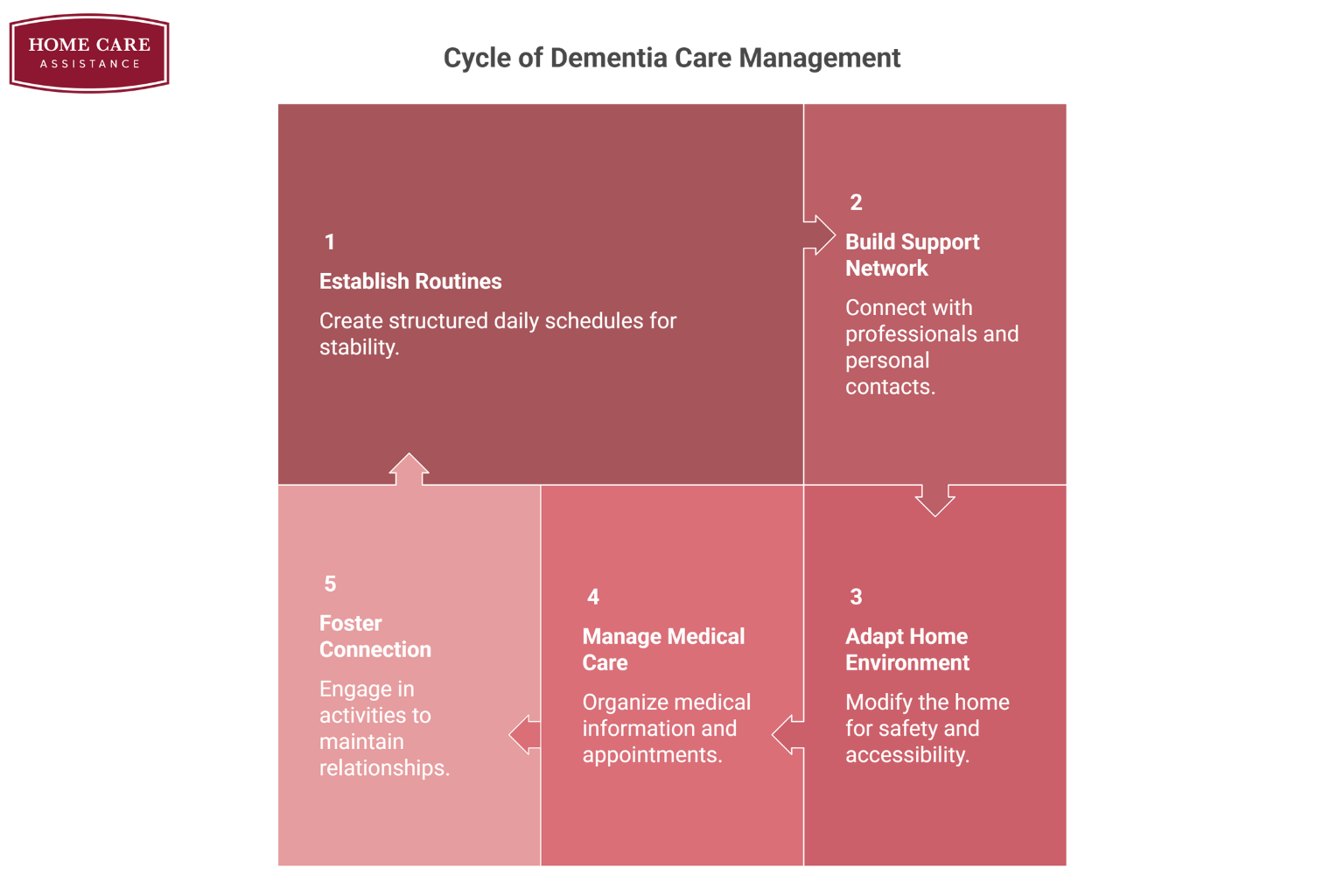Table of Content
Receiving a dementia diagnosis can feel overwhelming, but the journey doesn’t end there. Many caregivers have navigated this path and discovered practical strategies that made a meaningful difference in their daily lives.
Create Structure in Uncertain Times
Establishing routines becomes essential for managing the unpredictable nature of dementia progression. Successful caregivers emphasize that consistency helps both seniors with dementia and their family members feel more secure.
Daily schedules provide anchor points throughout the day:
- Set regular mealtimes and bedtime routines.
- Plan activities during peak energy hours, typically mid-morning.
- Keep important items in the same locations.
- Use visual cues like calendars and photo reminders.
These structured approaches reduce confusion and create a sense of normalcy that benefits everyone involved.
Build Your Support Network
Isolation often accompanies a dementia diagnosis, but connecting with others proves crucial for long-term wellbeing. Many caregivers find strength in both professional resources and personal relationships.
Professional support options include:
- Local Alzheimer’s Association chapters offering education and counseling
- Adult day programs providing supervised activities and social interaction
- Home caregivers for assistance with daily tasks
- Support groups specifically designed for families affected by dementia
Personal connections matter equally. Trusted friends and family members can offer respite care, emotional support, and practical help with errands or household tasks.
A professional caregiver with training and expertise in methods of cognitive stimulation can be a wonderful asset for an older adult with dementia. Not every senior has the same care needs, which means they don’t all need the same type of home care. You can rely on Home Care Assistance to provide an individualized care plan to meet your elderly loved one’s unique care needs. Our holistic Balanced Care Method was designed to help seniors focus on healthy lifestyle habits, such as eating nutritious foods, exercising regularly, and maintaining strong social ties, and our Cognitive Therapeutics Method offers mentally stimulating activities that can boost cognitive health and delay the onset of dementia.
Adapt the Home Environment
Safety modifications and environmental changes can significantly enhance quality of life while allowing for greater independence. Experienced caregivers recommend focusing on both immediate safety concerns and long-term accessibility needs.
Key home modifications include:
- Installing grab bars in bathrooms and along hallways
- Removing trip hazards like loose rugs or cluttered walkways
- Improving lighting throughout the house, especially in stairways
- Securing potentially dangerous items like sharp objects or cleaning supplies
- Adding locks or alarms to prevent wandering
These changes don’t need to happen all at once. Prioritize the most pressing safety concerns first and then make additional modifications as needs evolve.
Manage Medical Care and Documentation
Staying organized with medical information becomes increasingly important as dementia progresses. Caregivers who develop systems early find the process much more manageable over time.
Essential documentation strategies:
- Maintain a current list of all your loved one’s medications, including dosages and timing.
- Keep copies of important legal documents easily accessible.
- Create a medical history summary for emergency situations.
- Establish relationships with healthcare providers who understand dementia care.
Many families benefit from appointing a primary point person to coordinate medical appointments and communicate with healthcare teams. This reduces confusion and ensures consistent care.
Caring for a loved one with dementia is a challenging task for anyone. The responsibilities can sometimes feel overwhelming, but help is available. Seniors can face a variety of age-related challenges. Though some families choose to take on the caregiving duties, there may come a time when they need a trusted Opelika in-home care provider. Families sometimes need respite from their duties so they can focus on their other responsibilities, and some seniors need around-the-clock assistance that their families are not able to provide. Home Care Assistance is here to help.
Find Moments of Connection and Joy
Despite the challenges, many caregivers discover meaningful ways to maintain relationships with their loved ones and create positive experiences. These moments often became treasured memories for the entire family.
Activities that foster connection include:
- Looking through photo albums and sharing old stories
- Listening to favorite music from earlier decades
- Engaging in simple creative projects like art or gardening
- Taking short walks in familiar neighborhoods
- Preparing favorite recipes together when possible
The key lies in adjusting expectations and focusing on emotional connection rather than perfect execution. These shared experiences provide comfort and maintain important bonds even as cognitive abilities change.
Dementia can be challenging for seniors to manage, but they can maintain a higher quality of life with the help of professional dementia care. Opelika seniors can benefit greatly from the Cognitive Therapeutics Method (CTM), an activities-based program designed to promote cognitive health and delay the onset of dementia. CTM is included at no additional charge with any of the in-home care plans provided by Home Care Assistance. To create a comprehensive in-home care plan for your parent, give us a call at (334) 744-7100 today.

